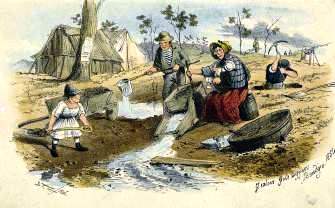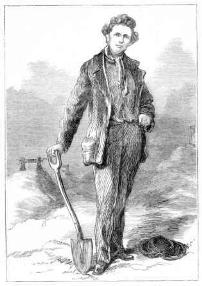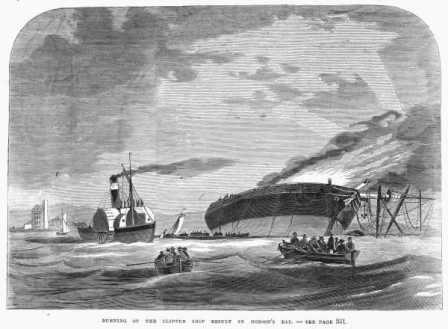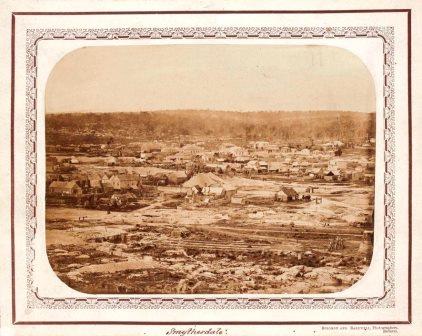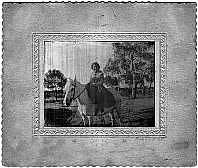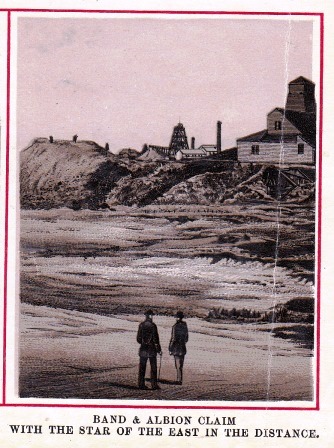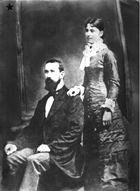
|
On this page: EUREKA? We Were There Are our foremothers to be remembered just as wives or women being assisted to find a job? When women are silenced, so is family and community.
EUREKA? We Were There a. WE THE PEOPLE As part of our heritage, we remember and respect the claim made at the Eureka Stockade on the 3rd December 1854 "we swear to stand truly by each other and fight." In The Forgotten Rebels of Eureka, Clare Wright explains: Ellen Young: But where is it? The admission, respect and regard is not there at present. I looked up ‘women and Eureka’ on the Australian Government website and found nothing by or about women except for this one entry: Are our foremothers who worked on the goldfields to be remembered as just token ‘them’ who were ‘assisted to get a job’? Is this what we teach our children? Women on the goldfields were miners, farmers, teachers, writers, journalists and traders. They were activists and actors; on their own; in partnership with their men; in partnership with women. They acted independently in the world as well as being wives, carers and mothers. Remembering women also means remembering family, community, relationship and anything or anyone outside or considered unimportant to the dominant economy. The work of Aboriginal women is doubly neglected in the records, yet Clare tells us that Aboriginal people’s superior knowledge of gold deposits, like their prior knowledge of the land, was no secret. I found no mention of Aboriginal women being on the goldfields in Victoria, though. Perhaps there is an extra reason for that - by 1863 Aborigines in Victoria had lost out badly. Yvonne Smith ed: Patricia Grimshaw, Marilyn Lake, Ann McGrath, Marian Quartly: Even though they were mainly neglected, ignored and otherwise silenced, women from here and from overseas touched the lives of others through time right up until now ... Clare Wright: One young woman expressed her delight more concisely. Going to the goldfields, she said, was like "parting with my sex for a season" ... a letter to the editor of the Ballarat Times in 1856 provides compelling evidence that there were women on the diggings who interpreted the ethos of political and social inclusiveness as an invitation to participate more fully in the decision-making processes that governed their lives. p.212 Victorian Historical Journal, Women's Suffrage Centenary Issue Volume 79 No 2 Nov. 2008 ‘Little is known of Mary Fortune. She kept her identity secret by writing under the names of Waif Wanderer or W.W. Arriving in Australia with her young son she supported herself by writing about life on the goldfields and in the cities. She became Australia’s first female writer of crime fiction.’ ‘Mary Fortune - W.W: To convince myself that I was awake I got up and dressed myself. I was surrounded on all sides by a calico wall that rendered windows quite unnecessary… Never shall I forget my first look at the diggings by daylight, or the first breakfast partaken of on them. It was from a back entrance that I saw the piles of uprooted soil, where the diggers were burrowing like moles, and heard the monotonous rock of a hundred cradles that went ‘swish, swish’ down by the creek that wound through the Flat. It was from thence also that I saw the long double lines of business tents that formed the street, and the waving of gay flags of all nationalities, from the rough flag poles in front of store, or restaurant, or billiard room, or what-not. It was from thence, too, that I laughed at and commented on the extraordinary display of constructive and adaptive ability displayed in the material and formation of the hundreds of odd chimneys within my view.’ Mary Fortune W.W. - (Waif Wanderer): (from ‘Song of the Gold Diggers’, 1855) ' Dorothy Wickham: Clara Seekamp to Governor Hotham, New Year's Day 1855: Poor Governor Hotham! Could you not have found some other more truthful excuse for all the illegal and even murderous excesses committed by your soldiery and butchers? ... Why did you disregard our memorials and entreaties, our prayers and cries for justice and protection against your unjust stewards here, until the people, sickened by hope deferred, and maddened by continued and increased acts of oppression, were driven to take up arms in self-defence?’ Ballarat Times 1856, Letter to the Editor: I have read the Gold Fields Act 18 Vic No 37, and find it silent as to sex ... Your opinion will be anxiously waited for by myself and many other ladies ambitious of a seat in the local Legislature of Ballarat.’ The Ballarat Times 1 January 1855, j. LIVING AND WORKING Who would have thought a diverse assortment of gold-diggers would come together from around the world and create a culture on the goldfields where the differences between men's and women's roles, rich and poor, local and newcomer, capitalist and socialist, would be so much less than it had been; and interdependent world where partnership and co-operation was practised and where, for a little while, old, old, enemies lived side by side. The Ballarat Times Saturday September 30, 1854: Notice - All persons indebted to me, the undersigned ____ of Ballarat, in the colony of Victoria, butcher and cattle dealer, are hereby required to pay and settle same with my wife Mrs ____ during my absence from the colony. Missing Friends - If this should meet the notice of ____, she is requested to write to Catherine, c/- Father Smyth, Catholic Priest, Ballarat.’ Advertisement - Eagle Dining Rooms, Ballarat Flats ... We trust that by civility, attention, cleanliness and a good table, to merit a share of your patronage. Advertisement - Dr. Glenndinning, A.M., Surgeon etc, Hospital, Red Hill, Ballarat. To the Diggers of Victoria - The inhabitants of Buningyong, being convinced of the existence of rich Gold Fields in the vicinity ... invite the Diggers of Victoria to open up the ground.’ http://www.reasoninrevolt.net.au/biogs/E000139b.htm k. SARAH DEVONPORT Many women came as wives, such as Sarah Davenport. Have you got a licence? I said: my husband has got a licence and the Parson made us one ... are you going to divide us? l. SARAH HAMMER But she also was tough. She had walked from Melbourne because she didn’t like being jogged, coming to the goldfields with her child because she didn’t want to stay in Melbourne and just be a housewife. She opened and ran the shop to earn money to support her husband at the diggings and because there wasn’t much housework to do in a tent. In Recollections of Ballarat Lady’s life at the diggings fifty years ago this doctor’s wife described her life running a shop in half a divided tent with the shop taking up the other half as surprisingly comfortable except for the flies and mosquitoes. 'One remarkable fact about life at the diggings in those early days was the freedom of our dwellings of all attempts at robbery ... Our canvas houses were of a most fragile description ... Many a night when the doctor was away attending a patient I have lain there with no companion but my child, yet I was never once disturbed ... At the commencement of 1855 the diggers had settled down once more to their work, after all the excitement of the past two or three months, which had culminated in the unfortunate Eureka Stockade engagement.' n. ELLEN LACY o
. THE SANDHURST IMPERSONATOR
p. WHAT A WOMAN ON BALLARAT CAN DO Weekly Times of December 25, 1857 What a Woman On Ballarat Can Do: On observation, much to my surprise, I perceived the indefatigable wood-chopper to be a woman. At first, however, as the stately gums and other primitive monarchs of the forest, one by one, came down with a groan and a crash, I naturally supposed that the limbs of the fallen were merely designed to supply the wood yard of a provident neighbour, but not so … After the completion of this work, the conqueror next appeared in the field armed with maul and wedge, and with the utmost apparent good-will and determination, attacked the knotted trunks of the fallen trees. Immediately in front of her tent, or bark hut rather, is a low piece of ground (where) she staked off the area of an acre and erected the fence (which, by the way, is a substantial one), as heretofore, unassisted by anyone, she very deliberately set about excavation of a drain several hundred feet in length for the vegetable garden … I may further add, that … with the assistance of another female, her partner, she keeps a milk dairy, a lot of poultry, and a herd of pigs … Her reputation has become quite a prodigy in these parts and everyone in the neighbourhood should be able to point out the garden made and cultivated by a woman. The Grenville Advocate April 26, 1862: Working in a quartz claim, with all the industry and skill of some of our most practical miners, is to be seen an old lady, Mrs Craig, who, although upwards of sixty years of age, takes her turn at the windlass, and winds up a heavy bucket of stuff, from a depth of 180 feet, while her son, in this instance, her "mate" - is at work below.' Bendigo Advertiser, 21st April r. REBELS The only rebels I know about in our family were women. They ‘burned their boats’, in a way, by their independent behaviour. Mary Curry came to Australia in the ‘Result’ in August 1863, less than a decade after Eureka. She had five children at the time and soon after arrival became pregnant with Sarah - the first of another four, was born on the 3rd July 1864 - at Italian Gully in the District of Smythesdale in the middle of the Central Victorian goldfields.
In her attitude to her daughters Mary encouraged independent thinking in a way that was to be later seen in the Women's Movement - particularly Women's Liberation in the 1970's. A doctor, Dr Griffiths and a nurse, Mrs Mints attended Mary at Sarah’s birth so I looked up the local town, Smythesdale, to see if I could trace the nurse.
Smythesdale could boast seven churches and fifteen hotels then. I found one (or more) of the following occupations registered as living there: auctioneer; baker; bank manager; bank messenger; blacksmith; boarding house keeper; boot maker; brewer; bricklayer; butcher; camp warder; carrier; carter; chemist; clerk; coach proprietor; constable; cooper; dairyman; detective; draper; engine driver; fancy repository; fruiterer; gardener; grocer; hotel keeper; inspector police; ironmonger; laundress; livery stable keeper; manager; merchant; miner; minister of religion; newsagent; painter; photographer; postmaster; printer; reporter; saddler; school teacher; senior constable; sharebroker; solicitor; store manager; storekeeper; storeman; sub-treasurer; surgeon; surveyor; tailor; tinsmith; town clerk; watchmaker. But no nurses. s. THE SPIRIT OF REBELLION There was generally a spirit of rebellion apparent and acknowledged while Sarah was growing up, though. Grenville Advocate Friday December 12 1873: t. SARAH SUCCEEDED Mary encouraged Sarah to rebel against the role she was expected to play as a woman. She allowed that daughter, at least, to think and act for herself, supporting Sarah when she refused to marry and have children unless her prospective husband stopped going away to work. Sarah succeeded. Her prospective husband agreed and bought a business close to home that enabled him to employ a manager to run it day by day. She continued this tradition with her daughter, Daphne - my grandmother. With the doctor and the minister, she supported my Nana with her bid for independence. Nana wanted to nurse. Her father finally gave his permission, although he cut her out of his Will. Our Foremothers Here is one story of women in Victoria (Australia) "Nana told me she approached her father The scene was in the dining room 'NO DAUGHTER OF MINE WILL WORK FOR A LIVING.' There was a lot more, he was so angry. I asked her why she didn't give up, there and then. Later, during the depression of the 1930’s, Nana turned the whole large back yard into a vegetable garden so she could run what must be called an unofficial soup kitchen. When unemployed men came to her house looking for odd-jobs they found a cross - a message between battlers - that meant they would be fed, and they were, always. I understand these women all valued conforming to social expectations. Yet they each made powerful bids for independence and liberty, altering the course of their and their family’s lives. u. MASCULINE ASPIRATIONS Talking about why she closed her tent/shop after two years, Mrs Clendinning said that as Ballarat was becoming established: 'the time had gone by when, even on the goldfields, a woman unaccustomed to such work could carry on her business without invidious remarks.I began to fear my husband might be blamed for allowing me to continue at it. After the class of residents on the field had become so superior to those of the working class, whom we had found there on our first arrival, to whom all species of employment for women seemed perfectly natural if they could carry it on with success ... He (her husband) erected a wooden house ... This put an end to further remarks and allowed us to make our home fit for a lady and her doctor husband to occupy, and in a little time, to add a small garden to add to their comfort.' Alongside the evident spirit of collectivism, it seems divisions were re-appearing. A man complained that not enough was being done to find the 'responsible parties' who moved the Italian Gully school dunny to within a yard from the front door early one Sunday morning, before people came to the school to attend church. v. THE COUNTRY ALTERED Verity Burgmann & Jenny Lee ed:'The population rose rapidly, topping a million by 1861.' Making a Life A People's History of Australia since 1788 McPhee Gribble/Penguin 1988 p.24 Louisa Ann Meredith: From the summit to the base, the sloping hills are literally turned inside out, and show their lining to be of a darkish-nankeen colour. The little river at the foot is turned aside and dammed up, and ditched in and walled ut, and twisted, tortured, obstructed, and defiled in such a persecuting way lamentable to behold. Machines for deep-sinking were in active operation in many places, with wretched horses turning the huge teetotums round and round, pumping out water or drawing up earth; and the whold bed of the valley was occupied by great heaps of yellow soil, and yellow puddle lagoons, mixed with tents, huts, and kennels, swarmed over by a population hardly distinguishable, at a short distance, from the beloved earth they were manipulating; so accurately have they imitated the provision of nature for some of the insect world, in adopting for temselves the tint of their habitation. The universally displayed shirt-sleeves varied from a deep burnt timber hue, through every gradation of shade down to light yellow-ochre; but white was no more to be observed in Ballarat linen than in Rembrandt's pictures. Was this a hint of the beginning of the end of our version of Camelot? w. RESPECTING AUTHORITY Another ancestor of mine was in Ballarat then. Unlike Mary Curry his life is well recorded. Thomas O’Brien had been in the Royal Irish Constabulary before he migrated to Australia, arriving in Ballarat just three years after Mary Curry and her family. Like Mary he came out unassisted and was to have nine children. Like Mary’s husband, he went straight to the mines when he came to Australia - in his case the Band and Albion mine. Unlike Ralph Curry though, on the 20th June 1869 he joined the Ballarat Volunteers Rangers Corps. By 1872 he was, he said in his diary, tired and weary of mining ... I join(ed) the local Artillery Corps. On 16th April 1874 I got my appointment in the Victorian Police Force. I don’t know if he worked on the goldfields or at Ballarat. He did live at Ballarat, though. ‘I was born at Doonsallah Parish of Miltown Malbay, County Clare, Ireland, 11 August 1845 ... I remained under the tutorship of my father ... who was a pretty comfortable farmer ... came into Melbourne 12th November 1868 ... left Melbourne by the 3pm train 22nd November and arrived at Ballarat by 11pm, where I met a few friends including my uncle Mr Kennan who took me to my Aunt’s Hotel. About 3 weeks later I went to work at the Band and Albion. On 1st February 1869 I took up my residence at Mrs Guthries, also my aunt ... where I felt quite happy and comfortable. On 1st June 1870 I joined No.1 Band and Albion tribute party which did not pay ... I was appointed secretary ... This claim failed as well. I sold it to the Co.’
x. BOOMING BALLARAT Ballarat was booming. I found this in the Baallarat and District Trade Directory 1865-66 covering Buninyong, Browns, Creswick, Smythesdale, & Scarsdale: 226 Carpenters; 185 Hotel Keepers; 151 Grocers, Storekeepers etc; 129 Boot makers and Dealers; 103 Blacksmiths, Wheelwrights etc; 72 Plumbers, Painters, Glaziers etc; 70 Sharebrokers, Mining & Commission Agents; 66 Masons; 65 Dressmakers etc; 58 Tailors; 52 Bakers & Confectioners; 51 Engineers; 49 Drapers, Tailors, Outfitters etc; 49 Fruiterers; 41 Contractors; 33 Produce Dealers; 31 Gardeners; 29 Cabinet makers and Upholsterers; 27 Saddlers; 25 Surgeons (including Dr Clendinning, the Coroner); 23 Jewellers, Watchmakers; 22 Restaurants & Boarding House Keepers; 22 Chemists; 20 School Teachers; 20 Tinsmiths; 19 Hawkers; 18 Architects/Surveyors; 18 Ironmongers; 17 Auctioneers, Estate Agents etc; 16 Solicitors, Barristers etc; 14 Tobacconists; 13 Car, Coach & Carriage Proprietors etc; 13 Coach Builders; 13 Hairdressers; 13 Professors of Music; 12 Coopers; 11 Bankers; 11 Booksellers and Stationers; 11 Timber Merchants; 10 China & Earthenware Dealers; 10 Hat Manufacturers; 9 Horse Dealers; 9 Merchants; 8 Dairymen; 8 Printers; 8 Turners; 6 Leather Cutters; 6 Nurserymen & Seedsmen; 6 Pawnbrokers; 6 Photographers; 6 Servants’ Registry Offices; 6 Soap & Candle Manufacturers; 6 Toy & Fancy Repositories; 5 Boat Proprietors; 5 Gun Makers & Smiths; 5 Slaters; 4 Tent Makers; 3 Basket Makers; 3 Book Binders; 3 Nightmen; 3 Sweeps; 2 Hide, Tallow & Wool Merchants; 2 Undertakers; 1 Billposter; 1 Oil Merchant; 1 Stationer; 1 Coffee Roaster. Miscellaneous Artist; Carver; Cattle Salesmen; Chair Maker; Clogmaker; Cutler; Dealer in Building Materials; Gasfitter; Lime & Cement Merchant; Livery Stabler; Mathematical Instrument Maker; Mineralogist; Oculist; Optician; Rag Merchant; Rectifier & Distiller; Taxidermist; Ticket Writer; Wire Worker. There is a multiplicity of work listed, but very little women’s work is counted here. Women, of course, did work. A story I heard as a child told how, when the family moved to Melbourne, Thomas’s wife, Bridget, and their daughter Frances would bake bread and cook corned beef to put on the counter to attract hotel customers, each and every market day.
‘On the 11th May 1880 I was married at St Patrick’s cathedral, Ballarat, by the Rev Father Sheridan, to Miss Bridget Josephine Coleman, a most beautiful young woman to whom I was deeply in love for some considerable time at the time of my marriage.’ One of Thomas’s daughters, Frances - my other Nana, was concerned during the 1930’s depression that the Communists would disrupt the food supply, so she had two large lead chests made to store a cache of grain and other food essentials. y. WE THE PEOPLE DEMAND So it seems that there are two sides to the Eureka Stockade in our family and in me - the side that exemplifies authority and the side that exemplifies independence. We now acknowledge, and even celebrate, that both are our legacy, even when we don’t like the worldview of one side. But we still don’t acknowledge the feminist story as an intrinsic part of the whole, leaving our Eureka story incomplete and distorted. To repeat: It is time, I think, for us not only to respect the history of the claim ‘we swear to stand truly by each other and fight’ but to take up Ellen Young’s claim for justice - ‘We, the people, demand!’ Clare Wright, in the preface of The Forgotten Rebels of Eureka: z. WE DON’T HAVE TO CHOOSE Coming back to The Forgotten Rebels of Eureka, Clare explains in the preface - ‘Today, more than 150 years after the Eureka rebels raised their voices to demand justice and equality for the disenfranchised miner, there is a new plaque in Ballarat, at the entrance to the Museum of Australian Democracy at Eureka. Its language, thanks in part to discussions arising from the research for this book, is more inclusive: There is progress. But still we have to keep reminding the cultural gatekeepers that women were there, too, and that their stories are just as vital, just as valid and just as vibrant as the stories of men. This is not an ‘either ... or’ predicament. It is a ‘not only ... but also’ situation. We don’t have to choose. We just have to respect the historical record.’ The Forgotten Rebels of Eureka is also a good read. Geraldine Robertson, |
